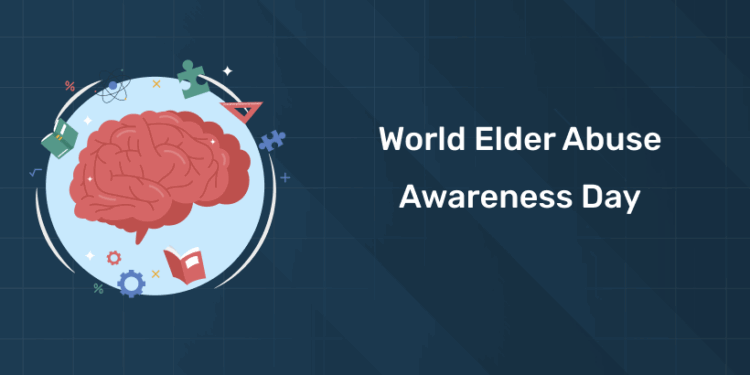Table of Contents
“People who don’t cherish their elderly have forgotten whence they came and whither they go.” – Ramsey Clark. Elder abuse is one of the form of exploitation of human rights which is not addressed as much as the other social issues. Elder abuse is a under-reported issue which is commonly visible both in developed and developing countries. It is expected that the number of persons aged 60 and above will grow by 30% from 1 billion to 1.4 billion between 2019 to 2030. This number will outnumber the global youth count. It is important that each one of us understands and identifies the challenges faced by the older people and work their well – being . In this article let us read more about World Elder Abuse Awareness Day 2025. The world elder abuse awareness day is on June 15. Article includes the world elder abuse awareness day history, significance, facts, quotes, messages and activities.
World Elder Abuse Awareness 2025 Date – June 15
In this article readers can get a glimpse on
- History and Objective of World Elder Abuse Awareness Day
- World Elder Abuse Awareness Day Theme 2025
- World Elder Abuse Awareness Day Quiz
World Elder Abuse Awareness Day
1: Who was the first woman President of India?
The World Elder Abuse Awareness Day (WEAAD) is observed every year on June 15. This day was first officially announced by the United United Nations General Assembly in the resolution 66/127, on December 2011.
This day provides an opportunity for the public to create a better understanding of the abuse older people suffer by raising awareness of the cultural, social, economic, and demographic processes affecting them. Elder abuse is one of the under-reported issue and is not addressed often when compared to other social issues. According to research 4 to 6 percent of the elderly suffer from some kind of abuse. On this day let us focus on the well-being of elders and check on ways to prevent elder abuse.
Free UPSKILLING Courses!
Take your first step toward mastering in-demand skills, acing interviews, and securing top-tier jobs with Entri's free upskilling courses.
Start Learning!History and Objective of World Elder Abuse Awareness Day
World Elder Abuse Awareness Day (WEAAD) was launched in 2006 by the International Network for the Prevention of Elder Abuse (INPEA) and was later officially recognized by the United Nations in 2011. It is observed annually on June 15 to draw global attention to the issue of elder abuse, which remains under-recognized despite affecting millions of older individuals worldwide. The day was established to unite communities, governments, and organizations in the common goal of protecting the dignity and safety of older people.
The objective of WEAAD is to raise awareness about the mistreatment and neglect that older adults face, often from those they trust most. Elder abuse can take many forms—physical, emotional, sexual, and financial—and can happen in homes, communities, or institutional settings. By recognizing and understanding the signs of elder abuse, societies can work toward early detection, better legal protections, and stronger social support systems for the elderly.
Another key goal of the day is to promote policies and programs that safeguard the rights of older persons and ensure their inclusion in all aspects of society. WEAAD encourages intergenerational respect and reminds the world that aging should not mean vulnerability. Through education, advocacy, and public dialogue, the day aims to inspire change, prevent abuse, and promote a culture where every elder lives with dignity and respect.
World Elder Abuse Awareness Day 2025 Theme
The theme for World Elder Abuse Awareness Day 2025 is “Create a World for All Ages”, which highlights the need for building inclusive, safe, and respectful environments for people of all age groups. It emphasizes that societies thrive when people of every age are valued, protected, and given opportunities to contribute. This theme urges individuals, communities, and governments to promote intergenerational solidarity and ensure that older people are not left behind in policy-making or community life.
By focusing on inclusivity, the 2025 theme sheds light on the systemic neglect and marginalization often experienced by the elderly. It encourages policies that address ageism, improve access to healthcare, social services, and legal protections, and foster stronger support systems across generations. “Create a World for All Ages” is not just a call to prevent elder abuse—it is a call to build a society where every individual, regardless of age, can live with dignity, purpose, and respect.
World Elder Abuse Awareness Day Previous Themes
World Elder Abuse Awareness Day, observed annually on June 15, brings global attention to the mistreatment and neglect of older persons. Each year, the United Nations highlights a specific theme to raise awareness, promote action, and encourage policy changes. Here are the themes from recent years:
- 2018: “Moving from Awareness to Action Through a Human Rights-Based Approach”
- 2019: “Access to Justice: Legal, Social and Economic Services for Older Victims of Sexual, Physical and Financial Crimes”
- 2020: “Lifting Up Voices”
- 2021: “Access to Justice”
- 2022: “Combating Elder Abuse”
- 2023: “Addressing Gender-Based Violence (GBV) in Older Age – Policy, Law and Evidence-based Responses”
- 2024: “Spotlight on Older Persons in Emergencies”
Free UPSKILLING Courses!
Take your first step toward mastering in-demand skills, acing interviews, and securing top-tier jobs with Entri's free upskilling courses.
Start Learning!What is Elder Abuse?
Elder Abuse is a form of violence to which the elders are subjected to. It can be the harm that is imposed on them by a person they already know, or it can be the harm caused by a member whom they have family relationship with such as spouse, children etc. or it can be the violence they are subjected to through outsiders. There are many forms of elder abuse.
Types of Elder Abuse
Few types of abuse our elders are subjected to is categorized int the following
- Physical: Physically harming the elder which causes physical injury to the elder is termed as physical abuse. It can be of different forms like hitting, punching, slapping, burning, pushing, kicking, restraining, false imprisonment/confinement. Physical abuse also includes giving excessive or improper medication or withholding treatment and medication.
- Psychological/Emotional: Any form of abuse that effects the mental and emotional well being of the elder can be termed as emotional abuse. It can be of different forms like humiliating a person, causing mental trauma through verbal abuse like yelling, name-calling, ridiculing, constantly criticizing, accusations, blaming. Emotional abuse can also take nonverbal forms such as ignoring, silence, shunning or withdrawing affection.
- Elder financial abuse: Financial abuse is also known as financial exploitation involves the misappropriation of financial resources by family members, caregivers, or strangers. It also includes the use of financial means to control the person.
- Sexual: Sexually harming the elder or causing sexual harassment is termed as sexual abuse. It includes forcing a person to take part in any sexual activity without his or her consent. Sexual abuse also includes forcing them to participate in conversations of a sexual nature against their will.
- Neglect: When the elder is deprived of the basic necessities then it can be termed as a form of abuse known as neglect. It includes depriving a person of proper medical treatment, food, heat, clothing, comfort, essential medication. Neglect also includes depriving a person of needed services to force certain kinds of actions, financial and otherwise. Neglect can be of two types active and passive neglect.
World Elder Abuse Awareness Day Quotes
- “The wiser mind mourns less for what age takes away than what it leaves behind ” -William Wordsworth
- “The old are in a second childhood “- Aristophanes
- “To care for those who once cared for us is one of the highest honors.” – Tia Walker, American blogger
- “Age is only a number. Keep an active life.” – Lailah Gifty Akita, founder of Smart Youth Volunteers Foundation
- Make sure they don’t feel they are burden. Stop elder abuse
- Stop elder abuse; remember, you will also become old soon
- The tragedy of old age is not that one is old, but that one is young – Oscar Wilde
World Elder Abuse Awareness Day Messages
- It is impossible to correct the elder abuse unless more people know about it. So stop whatever you are doing and raise your voice on World Elder Abuse Awareness Day.
- Seniors and elderly have been our guiding light for many years so from this World Elder Abuse Awareness Day onwards, it is our time to be their guiding light.
- On the eve of World elder Abuse Awareness Day, it is my request to all the good peoples of this world to become a positive hope for the elderly.
- Touch is a therapy, more effective than any medicines in the world. On World Elder Abuse Awareness Day, let’s hold the hands of our elders, let’s show that we care about them.
- You leave a lasting mark on an elder’s psychology when you physically or emotionally torment him or her. Let us cure their wounds on World Elder Abuse Awareness Day.
World Elder Abuse Awareness Day Activities
The following are the activities that can be observed as a part of observation of this day.
- First and foremost check for the well-being of elders in your family. Check if anything is bothering them physically, mentally or socially. Assure your involvement in helping them throughout their journey whenever requirement. Let them know that you care
- Arrange a meet for the children of the family with the grandparents. Let them speak and play with them. organize a bedtime story by grandparents activity and let the children and grandparents speak and laugh their hearts out
- Organize a greeting card preparation activity in your neighborhood. Distribute these well wishing greeting cards to the elders of your neighborhood and let them know that they are valued.
- Make it a point to meet elders that day and let them share what is bothering them.
- Conduct interviews with elders of your society. Check for what makes them happy. Check for what makes them unhappy. Do a quick analysis of the survey.
- Create awareness in your society with respect to the importance of respecting elders and to stop elder abuse.
- Educate the society on how to identify if an elder is getting abused.
- Educate the elders of the society on how to report if they feel they are getting abused.
- Poster-making competitions can be organized. These posters can be utilized to create awareness in the organizations and community
- visit an old age home. Speak to the elders there. Conduct happy activities for them. Make sure they are happy at the end of the day
- Instill in children and youth the importance of respecting the elders. Let them know that it is important to take care of the elders who once looked after them when young.
- Wear purple and support the cause for the welfare of the elders
- Organize a walk to create awareness on elder abuse day.
- Include presentations, webinars, and others ways to educate society on elder abuse.
World Elder Abuse Awareness Day Quiz 2025
A) Europe
B) Latin America
C) Asia
3. What is the most common form of elder abuse worldwide?
A) Physical abuse
B) Financial abuse
C) Emotional abuse
A) 25%
B) 50%
C) 80%
5. Which organization officially recognizes World Elder Abuse Awareness Day?
A) WHO
B) UN
C) UNICEF
A) 2006
B) 2011
C) 2015
A) 50+
B) 60+
C) 70+
A) Physical
B) Financial
C) Emotional
A) Blue
B) Purple
C) Green
Want More Engaging Questions?
Download our FREE PDF packed with insightful quiz questions to test your knowledge!
🔽 Click below to get your free copy now! 🔽
World Elder Abuse Awareness Day Quiz 2025 PDF
World Elder Abuse Awareness Day serves as a global call to action to recognize, report, and prevent the mistreatment of older individuals. It urges societies to acknowledge the dignity and rights of older people and to create safe environments where they can live without fear or harm. Elder abuse often goes unnoticed and unreported, making awareness efforts vital for change. By educating communities, supporting caregivers, and strengthening protective laws, we can reduce the risks faced by older adults.
The observance also emphasizes the need for intergenerational respect and inclusion. Older persons are valuable contributors to families and communities, and protecting their rights benefits society as a whole. Governments, organizations, and individuals all have a role to play in ending elder abuse. Through continued advocacy and education, we can move toward a world where every older person feels secure, respected, and empowered.
Free UPSKILLING Courses!
Take your first step toward mastering in-demand skills, acing interviews, and securing top-tier jobs with Entri's free upskilling courses.
Start Learning!Frequently Asked Questions
What is World Elder Abuse Awareness Day?
World Elder Abuse Awareness Day (WEAAD) is observed every year on June 15. It aims to raise global awareness about the mistreatment and neglect that older people face. The day encourages communities to take action against elder abuse in all its forms. It was officially recognized by the United Nations in 2011.
What is considered elder abuse?
Elder abuse refers to any intentional or negligent act that harms an older person. It can be physical, emotional, financial, sexual, or involve neglect. Abuse may occur at home, in institutions, or in community settings. Often, the abuser is someone the elder trusts, such as a family member or caregiver.
Why is elder abuse often underreported?
Many older adults fear retaliation, losing support, or not being believed. Some may feel ashamed or are unable to report due to cognitive impairments. Cultural stigma and lack of awareness also contribute to underreporting. As a result, most cases go unnoticed or unaddressed.
Who is most likely to commit elder abuse?
In many cases, elder abuse is committed by family members, especially adult children or spouses. Caregivers in homes or institutions may also be abusers. Financial abuse often involves trusted individuals, like relatives or legal representatives. Abuse can happen regardless of relationship or setting.
How can elder abuse be prevented?
Prevention starts with education and awareness for families, caregivers, and communities. Regular contact with older adults helps spot early signs of abuse. Strong social support systems and accessible services reduce vulnerability. Laws and reporting mechanisms also play a vital role in protection.
What are common signs of elder abuse?
Unexplained injuries, withdrawal from activities, poor hygiene, and fearfulness can be signs. Sudden changes in financial situation or living conditions may also indicate abuse. Behavioral shifts like anxiety or depression should be noted. It’s important to observe both physical and emotional cues.
What should you do if you suspect elder abuse?
Report your concerns to adult protective services or local authorities. Talk to the elder in a safe, respectful way if possible. Do not confront the suspected abuser without guidance. Timely action can prevent further harm and potentially save lives.
What is the global impact of elder abuse?
Elder abuse affects millions of older people worldwide, often leading to injury, illness, or premature death. It places emotional and financial strain on individuals, families, and healthcare systems. The issue is expected to grow with aging populations. Global collaboration is essential to address this crisis.
How does WEAAD contribute to combating elder abuse?
WEAAD spreads awareness and encourages open discussion about elder rights. It prompts policymakers and organizations to implement better protection measures. Events, campaigns, and educational programs are held worldwide. The day helps create a united global response to the issue.
How can individuals support the cause of elder abuse prevention?
People can volunteer with elder care organizations, educate others, and stay connected with older adults in their lives. Supporting laws and policies that protect seniors is also important. Promoting respect and inclusion for all ages helps shift social attitudes. Everyone has a role in building a safer, more compassionate world.












